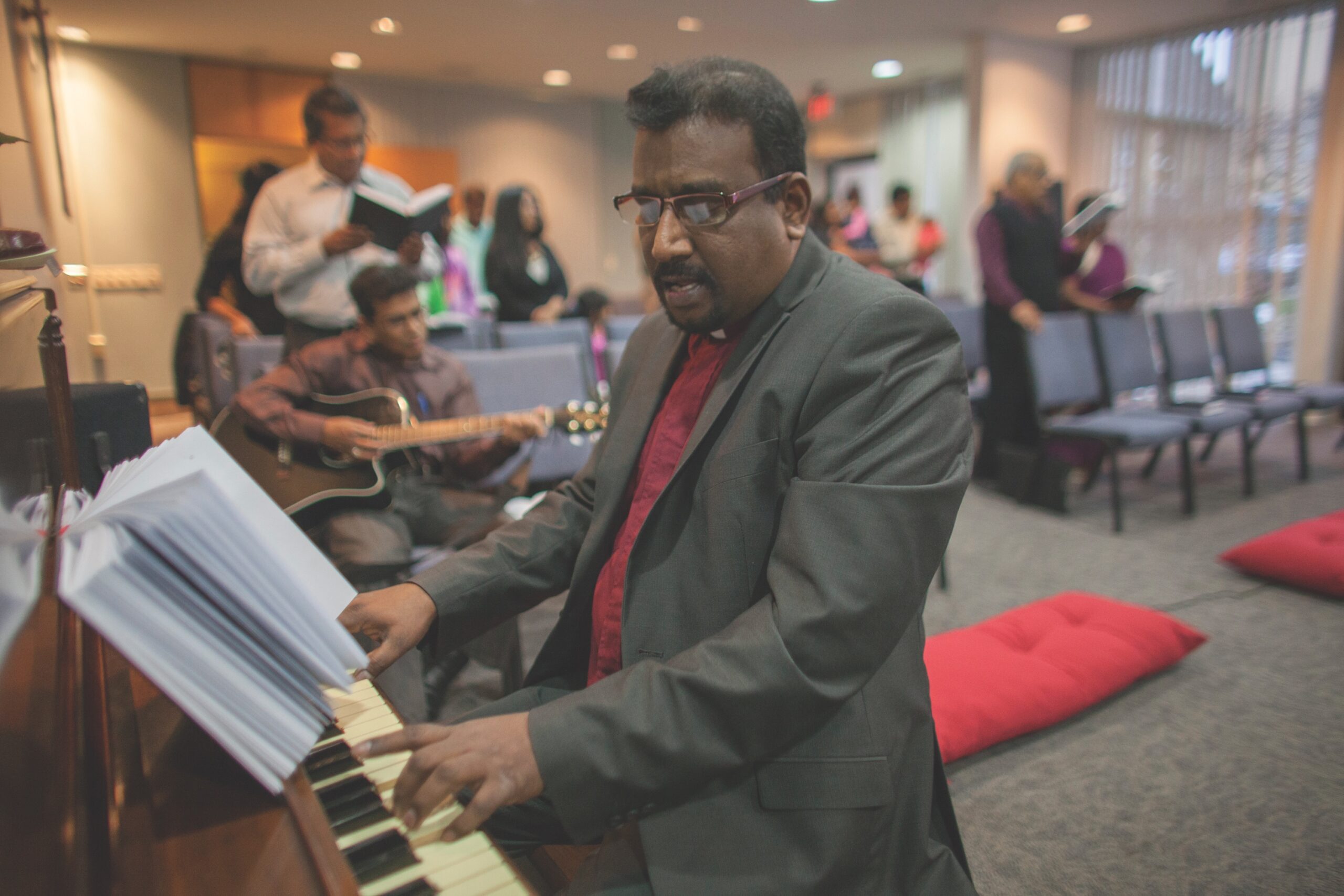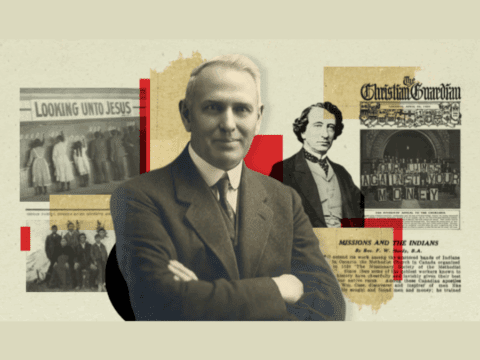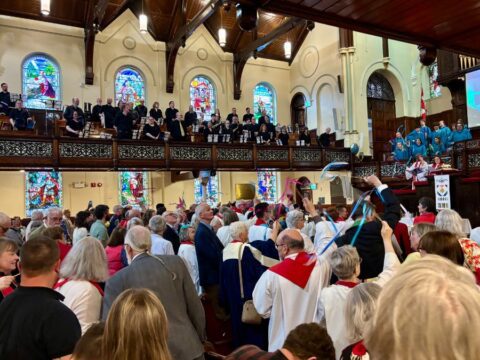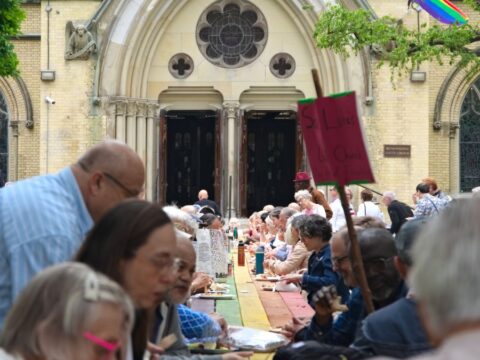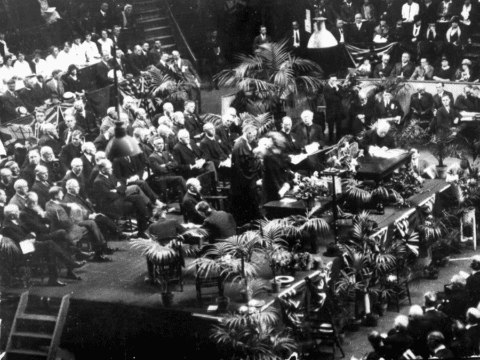With muted colours and neat rows of comfortable stacking chairs, the meeting room of the Toronto Southeast Presbytery gives few clues to its dual identity. As well as hosting regular gatherings of Presbytery and its committees, the airy space is the Sunday-worship home of the United Church’s newest ethnic ministry congregation.
A few of the women chatting before the service are dressed in colourful saris. A pair of crosses share space on the small altar table with a garland of silk flowers. But as the overhead video screen flashes the ancient Tamil-language script — made up of over 200 flowing characters — the otherwise recognizable hymns and order of service lose their familiarity.
Officially constituted as a United Church mission congregation about two-and-a-half years ago, Tamil United is a community of recent and more established new Canadians from the war torn island nation of Sri Lanka. While the small congregation of about 50 helps its members stay connected to their Tamil language and heritage, it also hopes to engage in social justice projects in their former homeland. For the larger United Church, Tamil United’s journey as a faith community will help the denomination fine-tune its quest for an intercultural identity.
First, some background. Except for a small minority of Christians, most Tamils are Hindu, with a history that dates back thousands of years to dynasties in the southern Indian subcontinent. (Tamils also live there now, in the Indian state of Tamil Nadu.) In Sri Lanka, Tamils make up less than 10 percent of the population. Sinhalese people, mainly Buddhists, account for 74 percent.
Tensions between Tamils and Sinhalese grew during British rule of the island (then called Ceylon) from 1802 to 1948 and continued after independence. Tamils began arriving in Canada after riots in 1983, and more followed during a 26-year civil war that ended in 2009. A United Nations panel report estimates that as many as 40,000 civilians were killed in just the final phases of the war; estimates of total dead and missing in the conflict are about 100,000. All Tamils have been touched by the war, but like many in the Tamil-Canadian community, those at Tamil United only want to talk about healing and reconciliation.
Some members of the congregation, like chairperson and founder Vilvan Gunasingham, immigrated to Canada in the early 1980s, while others came as immigrants or refugees over the following three decades. The Tamil-Canadian community is now estimated at close to 300,000, with about half living in the Toronto area, many in the Scarborough, Ont., neighbourhood that’s part of Toronto Southeast Presbytery.
Sri Lanka was in the Canadian news last fall when Prime Minister Stephen Harper refused to attend a Commonwealth meeting there over concerns about the country’s human rights record.
But the Canadian government’s record on welcoming Tamil refugees and immigrants is also debatable. Many Tamils have found official immigration channels impossible to navigate. Others who arrived unofficially and illegally — aboard ships off the coast of Newfoundland in 1986, and off the British Columbia coast in 2010 — were initially detained as possible security threats. Eventually, most were deemed genuine refugees.
The United Church of Canada was also cool in its first contacts with a group of Christian Tamils. Gunasingham and his family, from the Jaffna Diocese of the Church of South India, joined a Toronto United Church congregation in 1983. In 1994, shortly after General Council formed its ethnic ministries unit, he tried to help a fledgling independent Tamil Christian congregation join the United Church. It didn’t work out. Rev. Barbara White, now a retired United Church minister but then a layperson at West Hill United in Scarborough with Gunasingham, says General Council officials “couldn’t have been less interested.”
Rev. Michael Blair, the staffperson who now oversees General Council’s intercultural ministries, says United Church staff members were familiar with Korean, Japanese and Chinese churches from historical mission links but had little knowledge of and no connections to Sri Lankan churches.
A decade and a half later, Gunasingham’s dream of forming a Tamil United Church congregation was revived when he met a United Church minister and layperson from Toronto Southeast Presbytery at a local demonstration pushing for a peaceful end to the Sri Lankan civil war. That encounter got the ball rolling, and soon others from the Presbytery and the General Council office got involved.
A small group of Tamil Christians who had been renting space in a Scarborough Anglican church formed the nucleus of what would become Tamil United. They already had a minister in Rev. Milton Solomon from the Jaffna Diocese of the Church of South India (with Methodist, Anglican and Presbyterian missionary roots). Solomon is now in the process of being officially received into United Church ministry.
Under the supervision of Toronto Southeast Presbytery, the congregation was constituted as a United Church mission in May 2011. An annual $40,000 mission support grant from the M&S Fund helps the congregation pay its minister.
Tamil United’s worship is fairly traditional, with familiar Methodist hymns joining more upbeat contemporary praise songs. Except for Solomon’s on-the-fly translation for English-speaking visitors, the service is all in Tamil. Worshippers love to sing and do so with spirit. They spend more than a month preparing for an annual Christmas concert that brings in hundreds of visitors from the Tamil community.
With members and adherents from several Sri Lankan denominations, Tamil United is “a kind of an ecumenical church,” says Solomon. In its mission statement, the congregation says it will “participate in God’s mission and follow the way of the crucified and risen Christ.” It also pledges “to embody God’s love for all people” and “support difficult social issues faced by Tamils in Canada and Sri Lanka.”
Worship, Sunday school, Bible study and congregational get-togethers help keep church members rooted in their Tamil language and culture while they adjust to Canada. Gunasingham says congregational gatherings are sometimes “almost like a legal clinic” as he and others help newcomers navigate the cultural gulf between Canada and Sri Lanka.
“These kind of community gatherings will help us survive,” says Kiruba Thanesh, who migrated to Canada three years ago with her husband, Thanesh Velupillai, and their sons, ages 15 and 11. With university degrees and experience working for international NGOs, the couple qualified as skilled immigrants. But “starting [out] is difficult,” Thanesh says. As a psychological counsellor, she worked with refugees in Sri Lanka, “so I am using the coping mechanisms that I taught them.”
There are plenty of Tamils in Toronto, she says, “but they don’t have proper jobs, stable jobs.” Her husband, who ran million-dollar programs for a United Nations agency in Sri Lanka, began his Canadian working life as a payroll clerk. More significantly, she says, people in the mainstream community “think we know nothing, so that really hurts. . . . A basic need is acceptance.”
Erik Hunt, born in Canada after his parents emigrated from Sri Lanka in 1983, says Tamil United is “like a small family.” He grew up speaking Tamil at home and now uses it in his work as a bank financial adviser. He’s happy to see young children in the congregation “able to connect with their mother tongue.” Hunt also hopes the church will reach out to Tamils in Sri Lanka recovering from the civil war and the 2004 tsunami that battered the coastline.
Gunasingham emphasizes that church social justice projects in Sri Lanka would focus on helping women and children affected by the war. But building those connections won’t be easy, says Barbara White, now Tamil United’s Presbytery-appointed supervising minister.
The United Church currently has no global partners in Sri Lanka. The U.S.-based United Church of Christ does, working closely with the Jaffna Diocese of the Church of South India, the Church of the American Ceylon Mission — which grew out of earlier United Church of Christ mission work — and the National Christian Council of Sri Lanka, among others. The United Church of Canada is now talking with the United Church of Christ about working toward a full communion agreement, so shared global partnerships could be part of that, says White.
The congregation may also find a project closer to home. Late last November, Gunasingham was approached by the United Church’s refugee adviser Khwaka Kukubo to sponsor a Tamil refugee currently in France. The congregation would need to raise $12,000 quickly if it wants to get involved, says Gunasingham. If it works out, a refugee sponsorship could build the congregation’s profile in the Toronto Tamil community.
There are many Tamil Christian churches in the city, but none are affiliated with mainline denominations able to take part in refugee work or develop programs in Sri Lanka, Gunasingham says. “We are hoping that by going outside of the box and helping the people, they will say, ‘[Tamil United Church] is the place we want to go with our kids, because they want to go back to Sri Lanka and do some work.’”
He also hopes for closer connections between the young Tamil congregation and more established “mainstream” United churches. Michael Blair wants to see that too. “The challenge for us as The United Church of Canada is to accept their engagement in the broader church in a way that honours it and not push it away,” he says.
As a first-generation immigrant from Jamaica, Blair says he understands that an ethnic congregation initially needs to be a culturally familiar place for newcomers that helps them adjust to Canadian life.
However, he adds, interculturalism is a broader “engagement with difference,” and the United Church’s relationships with congregations like Tamil United can help develop this involvement across the whole church. The Tamil congregation may be small, says Blair, “but they have lots of energy and they are committed. And the fact that they want to be part of us calls us to say, ‘How do we become welcoming?’”
***
This story first appeared in The United Church Observer’s January 2014 issue with the title “Building cultural bridges.”

